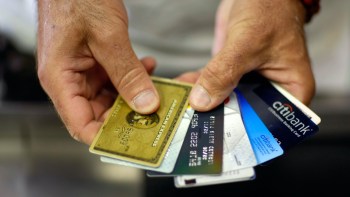Credit balances lower in 2nd quarter
TEXT OF INTERVIEW
STEVE CHIOTAKIS: The latest data from consumer credit reporting agency TransUnion shows the amount of money people owe on credit cards in the second quarter dropped to the lowest level in 8 years. We’re gonna get some analysis on that from William Dunkleberg, professor of economics at Temple University, joining us live to talk about it. Good morning, professor.
WILLIAM DUNKLEBERG: Good morning, Steve. How you doing?
CHIOTAKIS: I’m doing well. So we’re barely coming off a recession with high unemployment. How are people getting these card balances down?
DUNKLEBERG: Well, a number of people of course are just paying on them. Another bunch, of course, are getting into trouble and are making deals with the card companies. That is, the card company knows they can’t collect all the money, so it makes a deal and says “OK, if you pay half or if you pay whatever we’ll just write off half and the rest of it you don’t owe any more. And so you’re no longer in debt to us.” And so a lot of those write-downs are occurring. And that’s one of the reasons why the total amount of debt owed is falling is the debt lenders are just writing it off.
CHIOTAKIS: This negotiating, it’s still alive and well?
DUNKLEBERG: Oh yeah. You can see ads all over the radio and TV to have somebody negotiate for you, although you could probably do just as well on your own. You can just make an offer to the card company and they can say yes or no. So if you owe $5,000, you say, “Look, I can’t ever pay. You can’t afford to take me to court. How about I pay $2,500 and you call us even.” And often the companies will take that as an opportunity and do it.
CHIOTAKIS: If so much is going on along those lines, professor, what does that tell you about the economy?
DUNKLEBERG: Well we know that the economy is weak. We’ve seen no job growth. We’re going to revise the estimate of economic growth in the second growth down to a measly 1.3 percent this Friday, that’s my forecast — not nearly enough to get unemployment rate down. Eight million people lost their jobs since the recession started back in January of ’08. Obviously, if you don’t have a job it’s a lot harder to make those credit card payments, and that’s the difficulty that we have. So on top of that if you bought a house in the 2003-plus boom, you probably paid too much for it, you’re underwater, so you’re under pressure on your mortgage. So it makes it all very difficult.
CHIOTAKIS: Professor of economics William Dunkleberg from Temple University, thanks for your time today sir.
DUNKLEBERG: Oh, thank you.
There’s a lot happening in the world. Through it all, Marketplace is here for you.
You rely on Marketplace to break down the world’s events and tell you how it affects you in a fact-based, approachable way. We rely on your financial support to keep making that possible.
Your donation today powers the independent journalism that you rely on. For just $5/month, you can help sustain Marketplace so we can keep reporting on the things that matter to you.


















